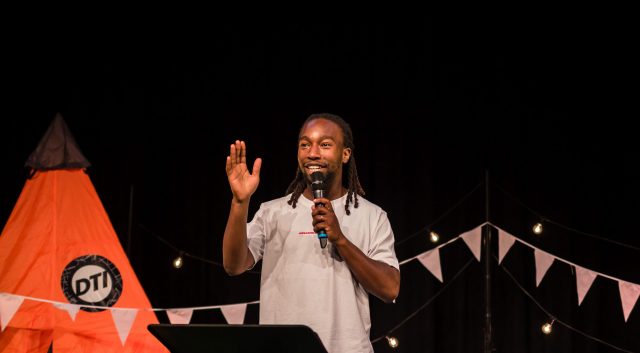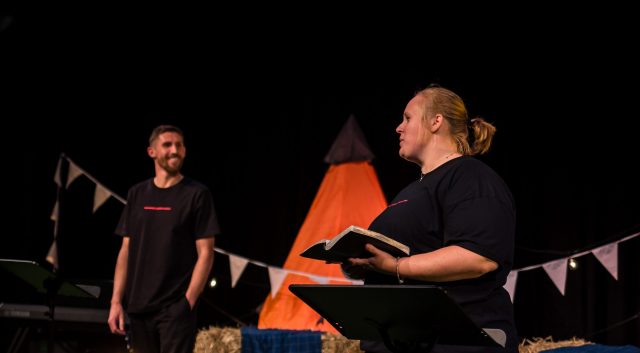Nicky Gumbel, Vicar of Holy Trinity Brompton, London, and pioneer of the Alpha Course, writes about the Hope that Jesus offers.
Three months ago Sam Morris, 23, was a militant atheist. He associated himself with the teachings of Richard Dawkins and other fervent opponents of faith and religion.
I’m going to take down a few irrational Christians here.
One evening he went online and discovered that an Alpha Course was about to start within easy access of his home, which brought him to our London church. He turned up thinking, ‘I’m going to take down a few irrational Christians here.’
But his encounter with the teachings and person of Jesus Christ was not what he expected.
On his questionnaire at the end of the course he wrote, ‘I have gone from [being] someone with no faith to someone with an immense hope. To live in a state of non-truth to living in truth is, to me, the difference between being bound and complete freedom.’
Recently he was baptised. He told me, ‘I’m free of my previous life. I was a slave to a lot of things. I was a slave to society, a slave to my peers… But now I’m free to live my life. I’m excited to see what God’s got in store for me.’
More than 19 million people around the world have now attended Alpha.
Sam is typical of millions of young people throughout the world who are searching for something outside this material world: for transcendence, for purpose and for community. They are asking, ‘Is there more to life than this?’, ‘What happens when I die?’, ‘Is forgiveness possible?’ and other big questions of life. There are few environments where these questions can be discussed openly and informally.
This is where Alpha comes in.
Sam is one of 2,000 people who have done the Alpha Course at our local church in the last 12 months. Seventy-five per cent of the guests are aged between 18 and 35 – the very ages at which so many are seeking spiritual truth.
More than 19 million people around the world have now attended the course in one of the 65,000 churches of all denominations – Catholic, Protestant, Pentecostal and Orthodox – that are running Alpha in 169 countries around the world. Last year alone two and a half million people attended Alpha and the numbers are growing at 20 per cent year on year.
Even in the US, with its great Christian heritage, the course is becoming a route to faith for young people. The US Conference of Catholic Bishops has identified the course as one of the best methodologies for their New Evangelisation initiative.
So what is Alpha?
It is a free 10-week course – one evening or morning a week – during which people from outside the church, mostly people who would not call themselves Christians, come together for a meal, a talk (‘Who is Jesus?’, ‘Why did Jesus die?’, ‘How can I have faith?’) and then discussion in small groups.
For many years I, too, was an atheist.
It is described as an ‘opportunity to explore the meaning of life’ and is run primarily in local churches where the course is often led by volunteers.
For many years I, too, was an atheist. Neither of my parents went to church. My father was Jewish by race, agnostic by religion. He escaped from the Nazis and moved to England where he met my mother who was a non-practising Anglican. So I did not have a Christian upbringing.
But when I went to university I met a group of people who had a real faith in Jesus. I decided to do some thorough research on the subject of Christianity. I happened to have a rather dusty copy of the Bible on my shelves and one night I picked it up and started reading it. I read all the way through Matthew, Mark and Luke and halfway through John’s gospel, at which point I fell asleep.
When I finished reading the New Testament I came to the conclusion that it was true.
When I woke up, I finished John’s gospel and carried on through Acts, Romans and 1 and 2 Corinthians. I was completely gripped by what I read. When I finished reading the New Testament I came to the conclusion that it was true.
I had an encounter with Jesus Christ, which changed my life. Immediately I became excited about Jesus and I longed for other people to experience this relationship as well.
However, I am not a natural evangelist. I tried many ways of presenting my new-found faith to my family and friends but somehow the heart of my discovery – a relationship with Jesus Christ – seemed to be difficult for them to understand.
This is why I was so excited to discover the Alpha Course. Having longed to find a way to share my faith with others, I was delighted to find that this small, apparently innocuous local introductory course in Christianity, running in the church where I was assistant pastor, was an accessible route to faith for young people outside the church.
Since sharing the course with other churches in the UK, the US and around the world, we have been astonished by the way that is has spread through so many different cultures.
For example, there are now more than 20,000 churches running Alpha in India and more than 500,000 people have been baptised in the last five years as a result of people attending the course in India. Alpha also runs in prisons, colleges, clubs, workplaces and homes, as well as churches.
In many countries there are now big advertising initiatives promoting local Alpha Courses. Every September in the UK, people are accustomed to seeing posters on billboards, taxis, the backs of buses, and in the underground asking the question ‘Is there more to life than this?’ and pointing them to a local course. There is currently one such billboard at Stratford underground station, which was seen by 85 per cent of the eight million visitors to the Olympic Park.
These initiatives are also taking place in many cities in the US as well as in Canada, Australia and Hong Kong.
Young people today…are looking for truth.
Many commentators, particularly in the West, are quick to declare that the Christian faith has become irrelevant to young people of today’s culture. This suggestion is not new. People have said this for centuries.
But young people today – like those before them – are looking for truth, meaning and purpose. And now, at the beginning of the 21st century, there are millions of young people like Sam Morris who are making the greatest discovery of their lives – a relationship with God through Jesus Christ.









